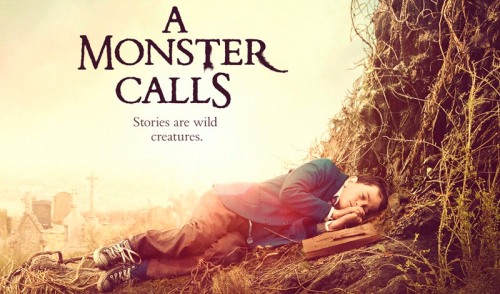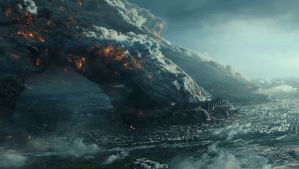Star Rating: 4.5/5
Director:
- JA Bayona – The Orphanage, The Impossible, Untitled Jurassic World Sequel
Cast:
- Lewis MacDougall
- Felicity Jones – Chalet Girl, The Theory of Everything, Inferno, Rogue One
- Sigourney Weaver – Alien, The Village, Paul, Exodus: Gods And King, Avatar I-IV
- Toby Kebbell – Prince of Persia, Wrath of the Titans, The East, Kong: Skull Island
- Liam Neeson – Michael Collins, The Next Three Days, Wrath of the Titans, The Dark Knight I & III, Felt
Music Composer:
- Fernando Velázquez – The Orphanage, The Impossible, Mama, Crimson Peak, The Invisible Guest
In medieval and early modern times a series of fairy tales came to the fore in European folklore. Based on true or quasi-mythical events, fantastical stories like Cinderella, Little Red Riding Hood, and The Little Mermaid taught children simple, moral lessons that could be adapted to all eras to help them deal with their problems. JA Boyena’s brilliant, A Monster Calls has a similar moral to its tale.

Conor (Lewis MacDougall) looking at the old yew tree in the distance, which is fabled to be a tree that can cure people.
The film is based on the book by Patrick Ness, which itself was inspired by an idea by Siobhan Dowd. The movie centres round lonely, 12-year-old Conor (Lewis MacDougall). His mother (Felicity Jones) is suffering from a terminal illness and he is being bullied at school. With so much going on in his life, Conor needs to find an outlet. One night, while at drawing at his desk, the old yew tree near his house comes alive (voiced by Liam Neeson) and advises him on how to deal with his problems.
A Monster Calls is a wonderful, yet heart-breaking fantasy drama. It is a folktale in all but name, since it handles very real issues and enables our protagonist to confront the unfairness of his situation in a constructive and tender way. Also, narratively, the movie links every element of the story together. By the end, viewers understand why Conor sees this particular monster, why the Monster has its voice, and the significance of the Monster’s advice, among others. This makes A Monster Calls all the more moving to watch.

Conor with his ailing mother (Felicity Jones), who is trying to reassure Conor that she will be all right.
The movie is delivered with great sensitivity. JA Bayona’s directing is top class and the fantasy parts of the film are always appropriate and never over the top. The script is down to earth and delivered with the right amount of anger, compassion, and bluntness, depending upon the scene. The cast must be commended for this; especially, young Lewis MacDougall. He spends much time on screen alone (or with a CGI monster) and he manages to hold the audience’s attention due to the strength of his acting. This is no easy feat (one need only watch Jayden Smith’s awful performance in After Earth to realise how talented an actor must be to keep viewers interested when he/she is alone on screen). If he continues to perform so well in the future, MacDougall will be a star.
But MacDougall is not the only one who shines. Felicity Jones gives a genuine and heart-felt performance, putting a good spin on her diagnosis for her son despite looking worryingly worse as the film progresses. Similarly, Sigourney Weaver performs splendidly as a grandmother locked in a bygone era, trying to come to terms with losing her daughter and having to look after her grandson. Toby Kebbell, too, does a good job as a man who is not the sharpest pencil in the packet academically, but has emotional intelligence and is trying to do his best for Conor, in spite of his character’s impossible predicament.
If the circumstances aren’t enough to touch people, Fernando Velázquez’s music will do enough to induce lumps in viewers’ throats. His score is subtle and tugs at the heart, thereby giving an added dimension to the pain that our protagonists are suffering, particularly Conor.

Conor facing the (Liam Neeson-voiced) Monster, which looks like a cross between Treebeard from Lord of the Rings and Arnold Schwarzenegger’s Terminator, urging the Monster to save his mother.
Nevertheless, what is it that Conor is actually suffering from? If A Monster Calls has a flaw, it is that the film vocalises Conor’s pain. This comes across as tell-heavy and unnecessary. Just as the timeless fairy tales did not spell out the moral message of their stories, the movie would have been better served if it would have let audiences infer its message. Yet, this is nip-picking as the film should be enjoyed for the wonder that it is.
All-in-all, A Monster Calls is a fabulous, tear-jerking movie. It has a splendid plot, a cast that fulfil their roles superbly, and it finely blends reality and fantasy. What’s more, A Monster Calls has a strong moral message. This is what makes it a twenty-first century fairy tale, comparable to the classic folklore stories. The film offers children a coping mechanism for when they are confronted with a horrible reality.
PG’s Tips





































